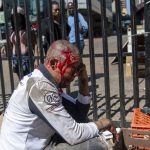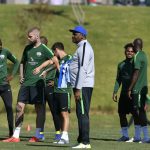Molefi Ntseki’s fashion and football
The Bafana Bafana coach’s fashion sense has improved after his glaring first squad announcement as head coach, but he still has to get the team looking as good as his improved shirt choices.
Author:
20 November 2019

Molefi Ntseki’s first three matches as Bafana Bafana coach is a tale of three shirts … and some football. But first, the shirts.
The former teacher hid his fashion sensibilities well while coaching in the junior ranks, whether at the Harmony Sports Academy, which he helped shape, or the men’s national Under-17 team, which he took to the Fifa Under-17 World Cup for the first time in the country’s history. He was swallowed up by tracksuits.
This was also the case during his time as assistant coach for various teams, from Bloemfontein Celtic to the national Under-20, Under-23 and Bafana Bafana. The unwritten law that only the head coach can wear real clothes – by not standing out, the other technical team members make whoever is in charge look good – gave him no choice but to lump his gigantic frame in tracksuits.
But Ntseki definitely stood out during his first press conference as Bafana Bafana interim coach in August to name the squad that was supposed to play Zambia, arriving at Safa House in Nasrec, Johannesburg, in an overdose of checked clothing – a checked blue-and-white shirt under a checked blazer. Madagascar ended up replacing Zambia, although ultimately both countries withdrew from playing the international friendly because of the xenophobic attacks that had hit Johannesburg and parts of the East Rand.
Related article:
His coaching credentials were solid after two decades in the game, working with every men’s national team, but his fashion game was found wanting. He stepped it up for the Nelson Mandela Challenge against Mali, though, his first assignment after being announced as head coach on a permanent basis. There, he wore a shirt that looked to be inspired by South Africa’s first democratically elected president, in whose honour the tournament is played.
Shirt I: Mandela-esque look
Ntseki’s shirt that day featured a shield and a map of Africa at a time when South Africa’s brand and pan-Africanism needed protection and reinvigoration. He started his tenure on a good note in the fashion sense and by beating Mali in an international friendly in preparation for Bafana’s back-to-back 2021 Africa Cup of Nations (Afcon) qualifiers against Ghana in Cape Coast and Sudan in Soweto.
He had to put his best foot forward, especially after the heroics of Egypt under then coach Stuart Baxter. And he did put his best foot – and shirt – forward to lead his side to a 2-1 win over Mali. In that match, there were glimpses of his philosophy: neat and quick interplay, pushing the wingbacks forward while tucking in the wingers, and playing a brave and enterprising brand of football supported by a solid structure at the back.
“My time with the Under-17s allowed me to put my personality into the team,” said Ntseki. “If you have a very disciplined team tactically, it helps. If you’ve got structure in terms of what you are working on, it helps. If you’ve got variations in your movement, it helps.
“Quick circulation of the ball, whether in attack or in defence, is important. The most important thing is that you must have individual brilliance in the team, those players who can win the game for you.
“With the Under-17s, we had S’bongakonke Mbatha and Reeve Frosler, who was a midfielder playing at rightback. He was helping us going forward. That’s more or less my imprint and style of play, which is why we fielded four attack-minded players against Sudan. You need speed, creativity and discipline in your attack.”
Shirt II: Black against the Black Stars
The Nelson Mandela Challenge, regardless of its significance, meant nothing in the bigger scheme of things. Ntseki’s real test was taking on an unsettled Ghanaian team with a lot of boardroom drama, a number of new faces in the squad, a new association president, Kurt Okraku, who had replaced the disgraced Kwesi Nyantakyi, and a coach whose future is bleak. Despite this chaos, Ghana is Ghana, four-time African champions and one of the most consistent teams on the continent.
Ntseki opted for a regal black shirt with an African touch in the home of pan-Africanism. At the end of the night, he and Bafana were seeing black after two sucker punches from the Black Stars, who won 2-0. Bafana never really arrived at the game in Cape Coast, nor did they test Ghanaian goalkeeper Richard Ofori, whom the South Africa-based players know well as he calls Pietermaritzburg home for most of the year, playing at Maritzburg United. Bafana’s poor performance in front of goal was alarming.
Related article:
“It takes a lot of energy to get into those scoring areas,” said Ntseki. “There is a lot of movement and a lot of creativity involved, and unfortunately for us against Sudan we managed to get behind their defenders more often.
“Missing a chance isn’t only about a situation that prevents you from scoring, it’s more mental. We came into the match against Sudan without the players telling us, but they were anxious and wanted to score as early as possible and score as many goals as possible. And when it comes to the national team, you don’t have time to work more on individual players, especially when it comes to the technical aspect of the game.
“We had two sessions before Ghana and one session before Sudan. Them getting into scoring areas shows that they really did well, but goal-scoring is a challenge.”
Shirt III: ‘The future is white’
The compressed schedule – that saw Bafana’s locally based players fly to Ghana on the night of 11 November, meet up with their overseas-based teammates in Accra the following day, drive to Cape Coast, have a formal session together on Wednesday 13 November, take on Ghana the following day, fly back to the country on Friday, have one session on Saturday – culminated in a must-win match against Sudan on 17 November. Ntseki went with a white shirt this time round.
“The shirt is white, and the future looks white,” said Ntseki after Bafana’s 1-0 win over Sudan at Orlando Stadium in Soweto. There were plenty of positives and negatives in the victory. The positives included the three points won and the build-up play among the forwards, led by Lebo Mothiba. He was supported by a three-pronged attack of Percy Tau, Lebogang Phiri and Thulani Serero. The trio, with Mothiba bullying the defenders with his size, bamboozled their opponents.
They created enough chances to match Sudan’s 4-0 thumping of São Tomé and Príncipe, but only took one of them. “It’s a smallanyana setback for us that we only won 1-0, but we have to play São Tomé home and away [and we are confident of getting six points in those games] before we play Sudan and Ghana,” Ntseki said.
“As a coach, you give yourself and the team confidence, which is why I said we are targeting four points in these two games. You plan accordingly, because the plan was to get a point if we couldn’t win in Ghana. We didn’t achieve that objective. The most important match after that was Sudan. You have a situation where you lose in Ghana, and then come home where there is so much pressure from everybody, including yourself, to win the match, because the only result we needed against Sudan was a win. We couldn’t even think about anything else.”
The negative was that, with all their dominance, Bafana still looked vulnerable. Against a better team, they wouldn’t have collected maximum points. The touches were easy on the eye, but without any penetration they amounted to nothing.
These qualifiers were tricky for Ntseki because without much time to work on the team, he couldn’t tinker much with the line-up, which is why against Ghana he started with nine players who featured in the XI that beat Egypt in the last 16 of the Afcon. Thato Mokeke replaced the injured Kamohelo Mokotjo while the in-form Bradley Grobler took Lebo Mothiba’s spot.
The future
Ntseki has to be braver going forward and move away from who he was previously as a coach, and not only in the fashion sense. While Baxter put in place a solid structure, he was conservative and stifled the team’s creativity. Ntseki has promised to change that, keeping the solid structure but giving the players more licence to show off their creativity and unlock defenders with their skills.
He will be off to England to assess Tom Barkhuizen, who has an eye for goal, and look to persuade the England-born forward to play for his grandparents’ country and help the side with their scoring problems. He promised to introduce more young blood into the team for their next assignment, the 2022 Fifa World Cup qualifiers in March.
Related article:
The coach has also promised to be more inclusive in how the team is made up, by having a selection committee that assesses players throughout the season and puts forward names, although Ntseki will still have the final say. It all sounds good on paper, but the real test will be whether or not that inclusive policy translates into better results. Ultimately, that’s what fans want.
His inclusivity when it comes to decision-making, promise to play a brand of football that South Africans will love, improved fashion sense and the buy-in of the players all looks promising.
“He has known me since I was a kid,” said Kermit Erasmus, who has had an on-and-off relationship with Bafana Bafana. “I remember playing against him when he was still coaching Harmony Sports Academy. They were a tough team to beat and play against. It just shows the type of coach he is and the brand of football he wants to play. It’s the type of football that we are known to play as South African players. It’s entertaining and going forward with a purpose to get results and score goals.
“He understands us as players, the culture of South African football, the culture of us as South African players and what it’s like growing up as a South African player. He knows what difficulties we face. I think that plays an important role, especially on how to manage the players. It will be a good thing going forward.”



